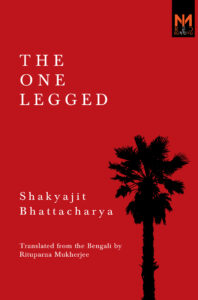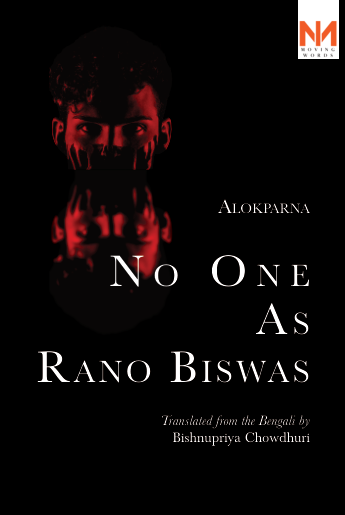TRANSLATED FROM THE BENGALI BY RITUPARNA MUKHERJEE
On a particularly cool, dewy dawn, waking up in his room on the second floor, Tunu heard Biswa Mama pulling water from the well and splashing as he bathed. And accompanying that was his humming that emanated from his throat and stirred the atmosphere, slithering up the branches of the Akanda, Siris and Guava trees, slowly touching the light cover of darkness, spreading across the empty field, rushing to claim the dark forest yonder. He could sense without opening his eyes how the song snaked up the one-legged palm tree in the middle of the empty field. Lakshmi Puja happened a few days back, the air of the dying night was soaked cold. Tunu got up and opened the window, albeit with a little trepidation. His grandparents were asleep in the next room. If they heard the window creak, he would surely get an earful, for the morning chill could aggravate his tonsils. Still, Tunu licked his lips greedily, pressing his cheeks to the grill of the window. He wanted, with all his might, to knife that darkness in the desolate field. With the break of each day, he longed to catch a glimpse of that ancient dome-like structure sitting in the forest through the mist. Everything around him—the damp neem trees, the dead crow, the heavy air—sat bloated and green like stale bread. His eyesight couldn’t get past the solitary palm tree in the forest. His eyes stumbled at the faint countenance of the umbrella-like head of the tree. Earthworms crawled up to his lower abdomen. His chest turned cold, and he felt the need to pee often.
He saw the boys in the field again, so early in the morning. He had seen them play there quite regularly. Tunu shut the window and laid down once again. He was sweating slightly in the closed room. When he opened the window yesterday, he saw Biswa Mama hugging his wife on the porch of his quarter at the corner of the garden. At that point, the afternoon stood absolutely secluded. Trusting that no one would spot them at that time of the day and facing the silent garden, Biswa Mama sunk his face into his wife’s fair, open breasts. Their ten-month-old child, Gublu, looked at the soft powder-puff sun with wide-open eyes. The infant cried out a little, startling her, but she composed herself in an instant. Tunu moved away from the window. He had an inexplicable feeling, heavy and numb, just like how it would feel if the distant palm tree were to suddenly show up and knock at his window. As if trains sped past his chest.
What had the boys come for so early in the morning? To pick palm fruits or to collect the date-palm juice? It was that time of the year, he had read that in the Puja edition of the Anandamela magazine. The boys seemed a little older to him, probably as old as his Choto Mama in his picture on the wall. He seemed quite lanky as a boy and had curly hair. He looked a lot like Topshey, detective Feluda’s assistant in that Satyajit Ray film. He suddenly felt angry. Choto Mama was responsible for all the trouble! This was his first time at his maternal grandparents’ place since birth. Staying at the two-roomed, shared house by a narrow lane in Asansol, his mother would regale him with stories of this ancient mansion under the sky as open as Biswa Mama’s wife’s chest, the ominous forest, and the continuous drone of the beetle at night, hearing which the blood in his heart would lurch and splash. His mother told him that Dida adored him, that she would attend to his every need! But here she would absent-mindedly cling to the rails of the window the whole day, waiting for Choto Mama. She would stare on helplessly, and at twilight, in the congealing darkness, she would command in a choked voice, “Don’t you go out to the field at night, my dearest!” Why couldn’t he? He was about to turn nine years old. He was not a child any longer. And what had happened last week was even more serious.
Tunu had seen a few boys play around the palm tree, sometimes at dawn, sometimes at dusk. He saw a few of them scale the palm tree and wanted to do the same. Walking around the palm tree at eleven in the morning one day, Tunu suddenly wrapped both his legs around the tree’s roots, and just as he was about to balance himself with both his hands, he heard a terrifying cry and fell. Lying on the ground like that, he saw Dida running towards him frantically. She grabbed him tightly and slapped his cheek, and then clutching both his shoulders, shook him violently and screamed in a distorted voice as if her mouth would foam on both sides, “How dare you climb that tree, tell me, how dare you? How will I show my face to your mother if something happens to you?”
Stunned, Tunu could not speak: “I… I would not have climbed it for real… I was just trying to see…”
Dadu and Biswa Mama had rushed in by then. They pulled Dida away from Tunu, but she kept screaming frantically, “Tunu, you will see me dead if you climb that palm tree! I swear!”
Panic-stricken, Tunu broke down into a sob. Dadu hugged him; meanwhile, Biswa Mama took Dida away to the house. The unfastened end of Dida’s saree grazed the ground, her eyes turned red, and the loosened locks on her head swayed like snakes. Tunu was shocked at the intensity of the situation. Hurting from an ache and insult lumped in his throat, he wept hopelessly for a long time, lying on his bed with his face pushed into the pillow. Dadu called him for lunch, and Biswa Mama too, but he didn’t go. Later in the afternoon, when the sun was about to dip from the top of the forest, Dida came in. Tunu shut his eyes tight, his face firmly pressed to his pillow. Dida caressed his head and body lovingly and said, “Please don’t be like this, my boy,” but Tunu did not open his eyes and wondered when he could run back to Asansol. And that afternoon, Dida recounted the story of Ekanore, the one-legged apparition.
“That palm tree you see ahead, he stays there.” With her eyes wide open, Dida whispered, “In one hand, he holds this salt sack for preserving the ears of little children. Whenever there is a window open, he leaps from the tip of the palm tree to sneak into the house. And then, with a knife, he removes the ears of little boys lying on their beds. Ekanore has really large teeth and round eyes that glow like a brick kiln. If you listen carefully, you’ll hear it whistling at night.”
Tunu shivered slightly. He wanted to snuggle closer to Dida’s lap, but Dida seemed to slip away again, completely oblivious to his presence, immersed as she was in her story. “When he is hungry, he feeds on those salt-rubbed ears. Sometimes, he climbs down the tree and walks all the way to the dome in the forest. He catches fish from the creek that flows by and leaves it to dry on top of the dome. And then he roasts and feasts on that dried fish. One can smell it in the air every now and then and know that he is hungry again.”
“Dida!”
“Hmm?” Dida appeared to have woken up from a deep slumber.
“I am scared.”
“Scared? Me too.” Dida’s voice seemed tinged with a winter’s night. She got up unmindfully and went to the window, “Come and eat, Tunu. The fish stew has turned cold.” But she stood there, her hands clutching two of the rods. She drifted again, forgetting about Tunu’s dinner, and waited for Choto Mama. Dida’s name was Radharani. Everyone had forgotten that. After her marriage, she was called Bhuban Master’s wife, and for six years after that, she was addressed as Mampi’s mother, as Mampi and her brother’s mother for the next twelve years, and again just as Mampi’s mother thereafter. Her son’s age had not exceeded twelve years since one cold winter evening, twenty years ago. Everyone had even forgotten his name. And it was this woman who looked outside, waiting, all day. This son of hers was making her forget about Tunu now. While sinking into a deep sleep, Tunu thought that he could never love his Choto Mama, never. A yearning for touch marked this thought of his; if only some unknown caring hand caressed his forehead and woke him from sleep, but he knew that no one would come.
It was eight in the morning. The mild chill still scraped the skin of the day. Rubbing his eyes, Tunu came downstairs. Biswa Mama was cutting tender coconuts at the well without a shirt on. Tunu was wearing a sweater and a muffler secured around his neck. He came and sat next to Biswa Mama. He was stuck in this old house, much like a sour burp that had a hard time finding its way out of the throat. The large garden at the back, those numerous locked rooms with buffalo heads and deer horns inside. There were huge sacks in the granary. It seemed to him as if little girls once played kitchen in those rooms. In the afternoons, he would feel as if a presence looked down from the tenements on the roof, staring at the ancient garden and the field downstairs. But he couldn’t see its face. Tunu looked at the palm tree. A few birds flew over his head. It was slightly foggy. “You said that you’d take me to the fair in the evening,” he said to Biswa Mama.
“Bravo!” Biswa Mama replied with a smile, “You are not one to forget, I see.”
Biswa Mama’s son, Gublu, looked at him and smiled. Pointing at a bird on the Siris tree in the garden, he cried unintelligibly, “Aw, aw, aw!” Dida came out of the house with a phone in her hand. She came and picked up the child in her arms. “What is this, Gublu? Should one wander about in such dust? Let’s go. I’ll warm up some milk for you.” Dida brought the phone close to Tunu, “Go on, it’s your mother.”
“Hello, Tunu? You are behaving yourself, right? You are not bothering your Dadu-Dida, are you?”
His mother spoke with the morbid, raspy voice of a dried river. Tunu saw Biswa Mama’s fair wife, whom everyone called Rina, crossing the gate and going inside with a pile of dirty clothes in her hand. Seeing Tunu, she smiled a little, and a rush of dark clouds rumbled within him.
“Hello, Tunu?”
“Hmm.”
“What’s wrong? Why aren’t you talking?”
“When will you come?”
His mother remained quiet for some time. Then she said, “My dear boy, just a few more days. And then…”
“The puja holidays are over. My school is open.”
“I have spoken to the headmaster. One medical certificate… anyway, you have a few more days of vacation, that’s all. I will come soon.”
“Baba also told me last night that he would come, but he didn’t. You will also not come.”
“Tunu”, said Ma sternly, “Haven’t you grown older? Should you talk like this? I will be there soon and bring you back to Asansol. Don’t be naughty, alright? And don’t be sad.”
Hanging up, Tunu saw Dida with a grimace on her face. Gublu was chewing the edge of her saree’s border and had drool all over his face. Dida, who seemed dainty like a wax figurine in the tangerine glow of the morning with Gublu in her lap, could make for a perfect model in a patachitra. Actually, only Gublu, among all the other family members, could make her smile, and the garden turned greener. “I want to visit Panchu Thakur’s fair, Dida. Biswa Mama will take me.” Tunu said.
“You have again wet your bed, Tunu.”
“Me? No… I don’t think so…”
“Yes, you did!” Tunu’s face turned pale. Dida must be getting irritated then, “I cannot wash the bed sheet every day! Why don’t you urinate before bed? I must tell your mother now.”
Tunu was so angry at himself that if there was a flow of cold mirror waters right under his feet, he would have jumped in it blindly. He was not a child, a fourth grader after all! Rina Mamima must be around, and her muffled, frivolous laughter was laced with sarcasm. The very thought seemed to dye Tunu’s ears pink! Dida went in. How could she insult him like that in front of everyone? Unconsciously, his hands balled into a fist. He would grow up to be a fine man one day. Dida was moving ahead when Tunu called her from behind, “Dida!”
Dida turned around.
“It won’t happen again.” His voice was choked.
She could have said something, but she went ahead without a word! Biswa Mama de-shelled the tender coconuts in quiet. One of the shells had three long scratch marks, like those from nails. He was working nonchalantly as if he hadn’t heard anything. Tunu’s heart is filled with gratitude for Biswa Mama. “Biswa Mama.”
“Yes?”
“What happened to Choto Mama?”
Biswa Mama’s hands stopped, “Who told you?”
“Ma did, once. Choto Mama hasn’t returned all these years. Apparently, he is lost”
Biswa Mama went quiet for a bit and then resumed his task.
“Tell me, what happened to him?”
Biswa stopped again. He thought of something and then replied, “Well, your Dida has already told you. Ekanore took him away.”
“Ekanore?” Tunu suddenly felt blood rush to his throat.
“Yes, Ekanore, that evil spirit, Tunu babu! That is why your Dida was so angry the other day.”
Tunu sat quietly. Biswa spoke a little later, “I have been working in this house ever since I was a boy. My father had done the same. It is not my place to say. Still, I will. Don’t ask your Dida about your Choto Mama, Tunu. It will only break her heart.”
“Why didn’t Ekanore return Mama? Dida could have asked!”
Smiling sadly, Biswa Mama said, “Your Dida still thinks he might return. But one who’s gone, does he ever… Let’s not talk about it anymore.” He forced the train of thought to shift, and suddenly, coming back to his senses, he commanded, “Be a good boy and nap after lunch; otherwise, I won’t take you to the fair.”
Rina Mamima stepped out from her room and sat beside Tunu. “I will go as well then. Tunu babu, you will take me, won’t you?”
“Why do you call me babu? I don’t like it.”
“That’s because you are a babu!” Rina laughed. Tunu liked watching the sun gleam off her teeth as if he had forgotten his embarrassment a while back, as if he could just drop his face on her lap like Gublu. Gublu was being treated to milk inside the house at that time, so Rina Mamima’s lap was empty. Smiling gently, Tunu said, “You know we have the Rath Fair in Asansol as well. Will you come?”
“I don’t think the fairs in the cities are as good as the ones here! I am from Kakdwip. I have never seen any fair like that at Burima’s place. Today, you will see so many children crowding around Panchu Thakur and Panchi Thakurani’s temple, and all of their heads will be shaved. They sacrifice their hair to the god!”
“I will go to that dome one day. Ma says there are ghosts there.”
“No, I don’t believe there are such things as ghosts.”
“Then what about the Ekanore?”
“Who’s told you it’s a ghost?” Biswa Mama started walking towards the house.
Ruffling Tunu’s hair a little, Rina Mamima stood up and smiled slightly. Looking at that smile, Tunu thought about how he would sleep in his Asansol bed, lying in wait for the predatory, muffled sounds from the adjacent room that would push him to one corner, constantly leaving him shriveled, folded into himself. “Don’t you feel ashamed to touch me?” “What does a coquette like you know of respect?” “Go to Jayramtala if you want, but you won’t take the boy.” “Don’t shout! I have seen the likes of you! Do you think I am scared of your temper?” When the words reached him, Tunu’s fears would sweat like a packet of milk kept outside the refrigerator. At that moment, the longing to sleep, tucked comfortably between Ma and Baba, floated like oil over the waves of his sadness. But Tunu was now imprisoned among the neem, mango, Kapas and Siris trees in the garden, and his Ma was far away. Rina Mamima had also gone inside her room. Alone, Tunu removed his slippers from his feet and pressed his toes on the dew-sodden, muddy soil, trampling the grass with his feet. An insect was travelling through the space between his toes. Tunu crushed and suffocated the insect, closing his toes forcefully. A solitary bird circled the palm tree. Usually, birds flying that high are difficult to recognize but Tunu could clearly make out the vulture. He had been seeing the image of the vulture in his schoolbooks since childhood. No one was around. The garden stood forlorn, empty of people, a glum cluster of trees. Did that vulture fly here many years ago? Was it possible to see Choto Mama from that height?
Also, Read Book Excerpt from Windborne by Sanjib Pol Deka, translated from The Assamese by Daradi Patar and Published in The Antonym:
Follow The Antonym’s Facebook page and Instagram account for more content and exciting updates.

































0 Comments